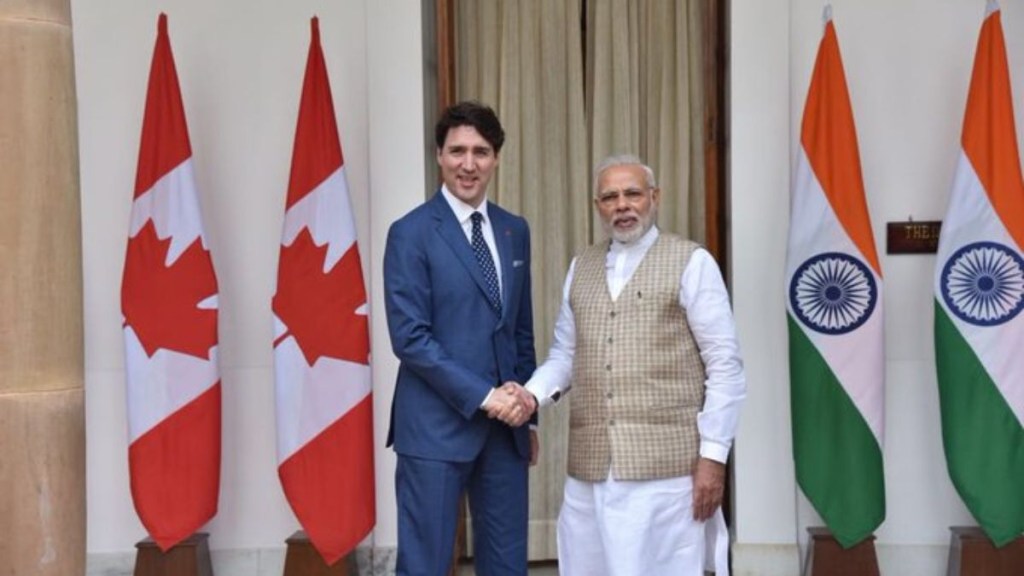India and Canada are engaged in discussions regarding achieving “parity” in the number of diplomatic personnel assigned to each other’s missions, as confirmed by the Ministry of External Affairs.
During the weekly briefing on Thursday, MEA spokesperson Arindam Bagchi restated India’s concerns about Canadian “interference” in India’s internal affairs and expressed the expectation that Canada would reduce the total number of its diplomats stationed in India.
Responding to a question, Bagchi explained, “Discussions are ongoing regarding achieving this parity, given the significantly higher presence of Canadian diplomats here and their continued interference in our internal affairs. I anticipate there will be a reduction.”
This development follows reports from the Financial Times, which stated that New Delhi has requested Ottawa to withdraw 41 of its diplomats from India by October 10. The newspaper also mentioned that India would revoke the diplomatic immunity of Canadian officials if they are not recalled by the specified date.
India’s request to recall a significant portion of Canadian diplomats in the mission and consulates stems from its commitment to ensuring the safety and security of its own diplomats in its missions in Canada.
On September 21, India cited concerns over “politically condoned hate crimes” and suspended normal consular operations in its missions in Canada.
Highlighting India’s priority of safeguarding its diplomats in the High Commission in Ottawa and other consulates across Canada, Bagchi reiterated, “We have consistently raised concerns about the security of our diplomats and premises in Canada, particularly in cases involving individuals sought by our security and judicial systems. This is an ongoing dialogue focused on security, and our diplomats remain safe without being targeted.”
India-Canada Relations
Despite these tensions, Canadian Prime Minister Justin Trudeau has emphasized that Ottawa does not seek to escalate the situation. The conflict emerged when he presented findings from an investigation into the June 18 murder of Khalistan Tiger Force leader Hardeep Singh Nijjar, attributing the incident to Indian agents.
Canadian Foreign Minister Melanie Joly confirmed ongoing communication with the Indian government, arguing that having diplomats on the ground is crucial for addressing the strained bilateral relations between the two countries.
External Affairs Minister S Jaishankar, during his visit to New York, voiced concerns about the permissiveness prevailing in Canada, which he believes is enabling threats to Indian interests.
India-US Ties
This situation gained further significance when Politico, a US-based publication, reported that the US Ambassador to India, Eric Garcetti, warned his team about the potential negative impact on India-U.S. relations due to the dispute between New Delhi and Ottawa over Nijjar’s killing. However, a US embassy spokesperson dismissed these reports, underscoring Ambassador Garcetti’s commitment to strengthening the partnership between the United States and India.
Meanwhile, the official spokesperson declined to comment on the matter during the briefing.
So far …
Tensions grew stronger between India and Canada, even though they were historically close. This happened after Prime Minister Justin Trudeau suggested in September that India might be involved in the killing of Hardeep Singh Nijjar on June 18.
Nijjar, a Canadian citizen, was shot dead by two masked gunmen near a Sikh temple in British Columbia.
India had labeled him a terrorist in 2020.
Trudeau told the Canadian parliament that their intelligence agencies were looking into whether “agents of the government of India” played a role in Nijjar’s killing.
India denied the accusation but said it would consider any specific information shared by Canada.
As a result of this dispute, both countries expelled one diplomat from the other’s nation.
On September 21, India stopped issuing visas to Canadian citizens, citing “security threats” at its missions in Canada.
India also wanted a balance in the diplomatic missions’ rank and strength between the two countries due to what New Delhi terms as Canadian interference in their internal matters.
Canada responded by reducing its staff in India, citing threats received on social media against its diplomats. They did this to ensure the safety of their diplomats.
Canada’s visa services in India, however, remained operational.
The United States, United Kingdom, and Australia urged India to cooperate with Canada’s investigation.
The Indian government has consistently reacted strongly to demands from Sikh separatists in Western countries for Khalistan, a separate Sikh homeland.
Nijjar openly supported the Khalistan movement.

